Construction Companies Lexington
Best Construction Services in Lexington
Get 3 FREE General Contractors quotes for your project today! Compare profiles, reviews, accreditations, portfolio, etc... and choose the best deal.
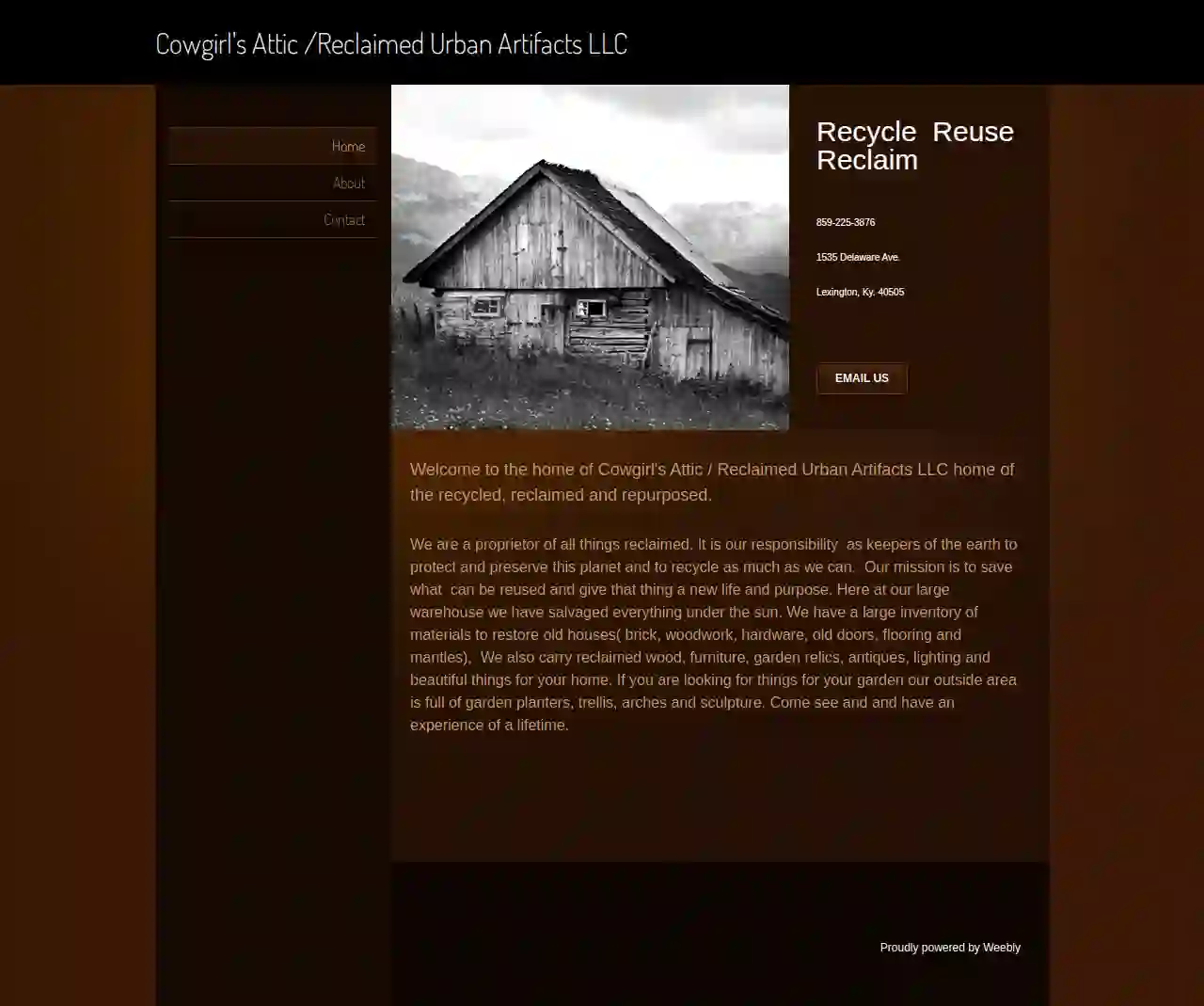
Cowgirl Attic/ Reclaimed Urban Arifacts LLC
3.548 reviews1535 Delaware Ave., Lexington, 40505, USWelcome to Cowgirl's Attic / Reclaimed Urban Artifacts LLC, your premier destination for all things reclaimed. Our mission is to save what can be reused and give that thing a new life and purpose. We are a proprietor of all things reclaimed, and it is our responsibility as keepers of the earth to protect and preserve this planet and to recycle as much as we can. Our large warehouse is home to a vast inventory of salvaged materials, including brick, woodwork, hardware, old doors, flooring, and mantles perfect for restoring old houses. We also carry reclaimed wood, furniture, garden relics, antiques, lighting, and beautiful things for your home. If you're looking for unique items for your garden, our outside area is full of garden planters, trellis, arches, and sculpture.
- Services
- Why Us?
- Gallery
Get Quote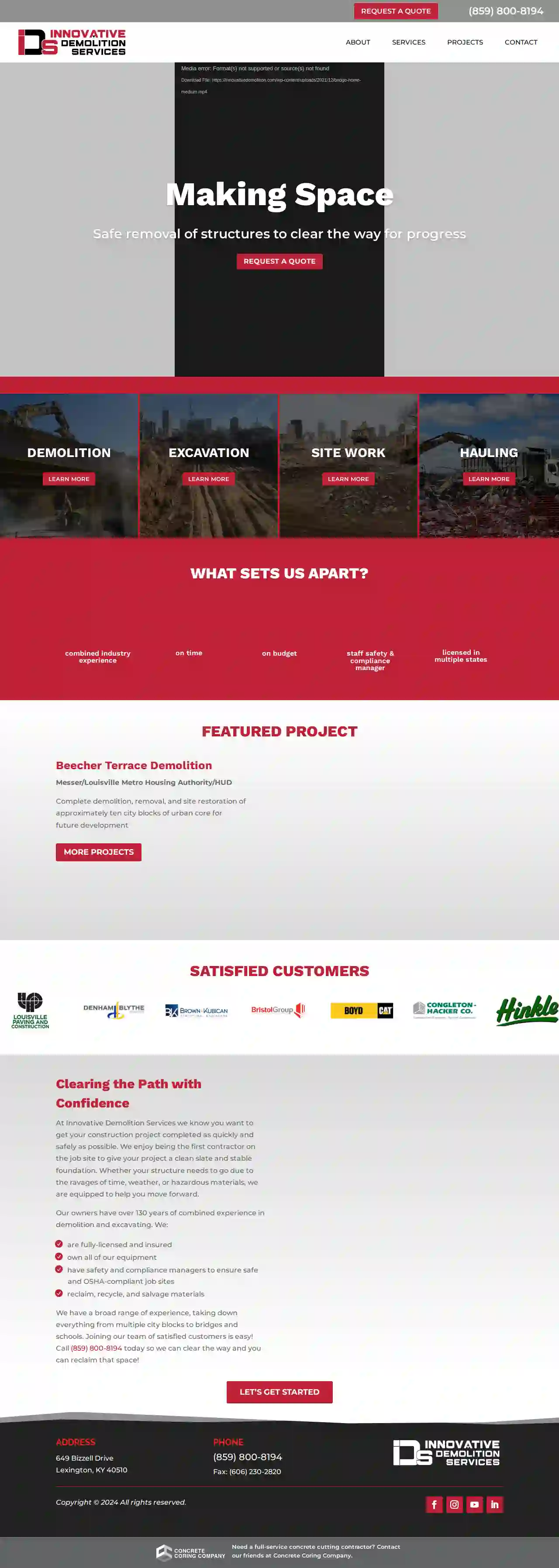
Innovative Demolition Service, LLC
4.414 reviewsLexington, KY, 649 Bizzell Drive, 40510, USInnovative Demolition Services is a leading demolition contractor specializing in heavy highway and structural demolition. With over 130 years of combined experience in commercial, governmental, industrial, and residential demolition, excavation, site work, and hauling, we are equipped to handle any project. Our team is fully licensed and insured, owns all equipment, and employs a full-time Safety and Compliance Officer. We also specialize in asbestos abatement, hazardous materials, and environmental remediation. Our commitment to safety, compliance, and customer satisfaction sets us apart.
- Services
- Why Us?
- Accreditations
- Our Team
- Testimonials
- Gallery
Get Quote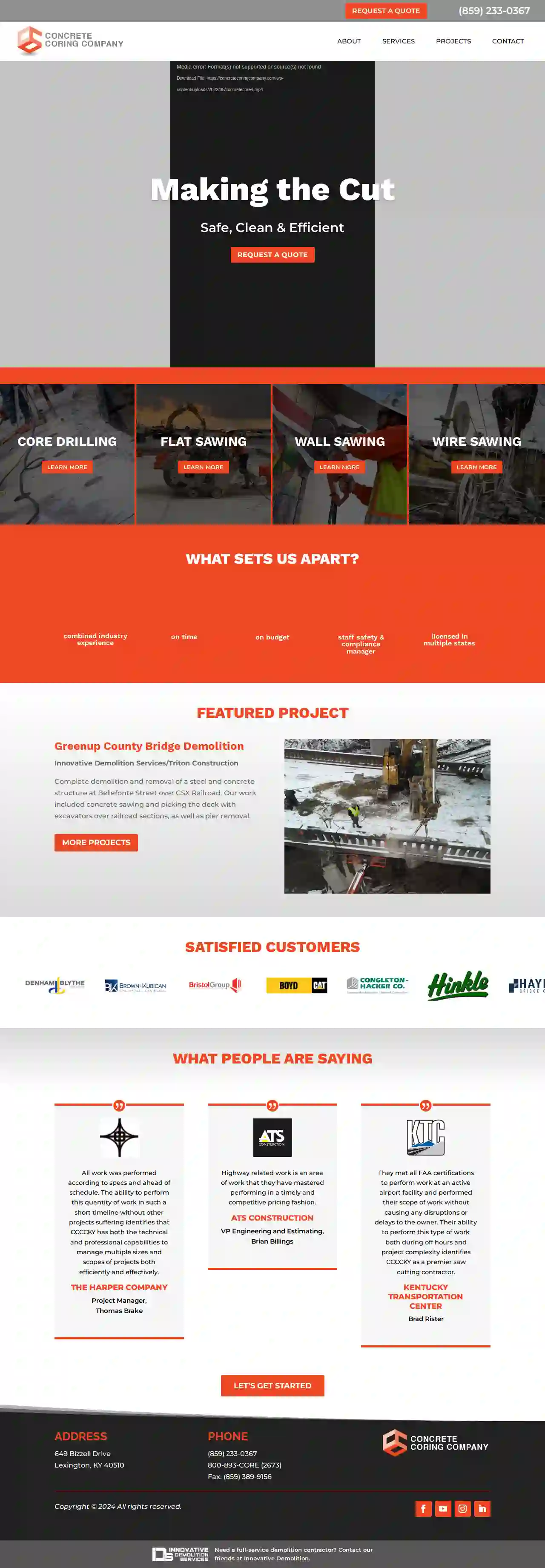
Concrete Coring Company of Central KY
52 reviews649 Bizzell Drive, Lexington, 40510, USMaking the Cut Safe, Clean & Efficient Concrete Coring Company of Central Kentucky is a leading provider of concrete cutting and sawing services. We offer a wide range of services to meet the needs of our clients, including core drilling, flat sawing, wall sawing, and wire sawing. We are committed to providing our clients with the highest quality services, on time and within budget. Our team of experienced professionals is dedicated to safety and compliance, and we are licensed in multiple states. We are proud to have a combined industry experience of over 50 years. We are committed to providing our clients with the highest quality services, on time and within budget. Our team of experienced professionals is dedicated to safety and compliance, and we are licensed in multiple states. What sets us apart? Combined industry experience On time On budget Staff safety & compliance manager Licensed in multiple states
- Services
- Why Us?
- Testimonials
- Gallery
Get Quote- Bl
Blethen Concrete Construction
51 reviewsLexington, US- Services
- Why Us?
- Gallery
Get Quote 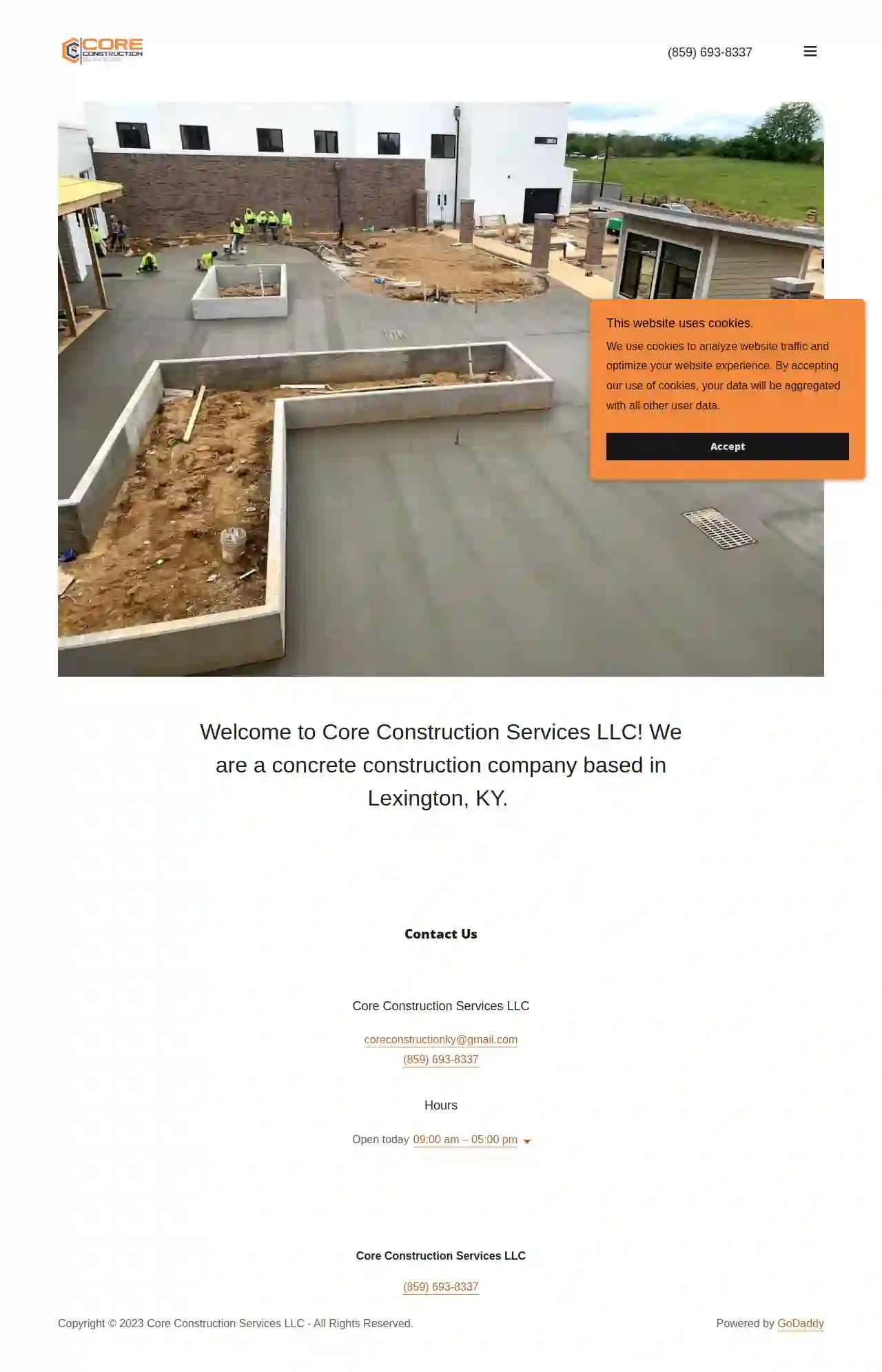
Core Construction Services
55 reviewsLexington, USWelcome to Core Construction Services LLC! We are a concrete construction company based in Lexington, KY, offering our services in Fayette and all surrounding counties. As a family-owned business with 20 years of concrete experience, we pride ourselves on delivering distinguished craftsmanship, efficient performance, and high-quality customer service. Our services include driveways, patios, sidewalks, slabs/foundations, and decorative finishes like stamping. We are committed to exceeding your expectations and delivering exceptional results for every project.
- Services
- Why Us?
- Gallery
Get Quote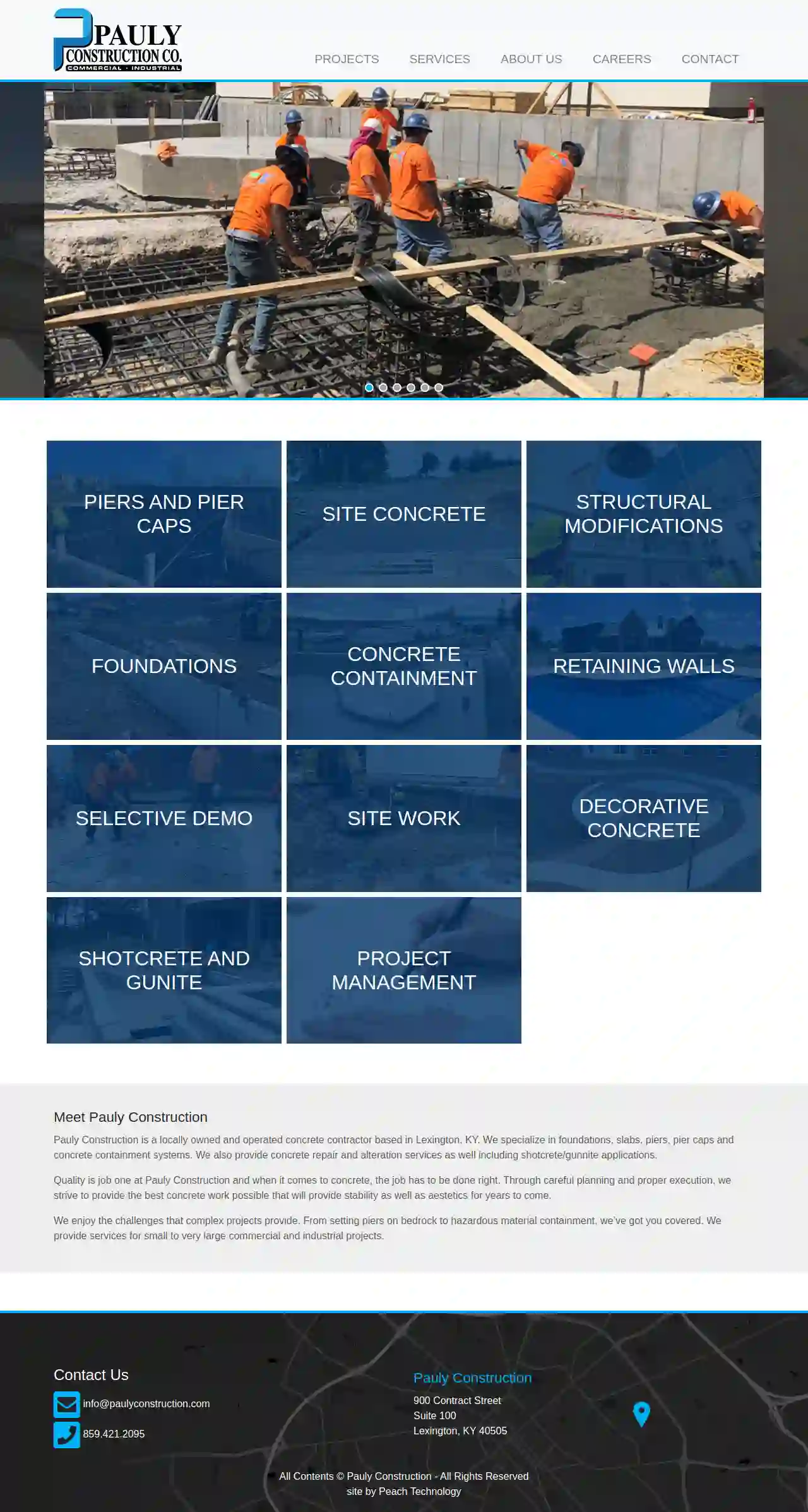
Pauly Construction
51 reviewsSuite 100, 900 Contract Street, Lexington, 40505, USPauly Construction is a locally owned and operated concrete contractor based in Lexington, KY. We specialize in foundations, slabs, piers, pier caps and concrete containment systems. We also provide concrete repair and alteration services as well including shotcrete/gunnite applications. Quality is job one at Pauly Construction and when it comes to concrete, the job has to be done right. Through careful planning and proper execution, we strive to provide the best concrete work possible that will provide stability as well as aesthetics for years to come. We enjoy the challenges that complex projects provide. From setting piers on bedrock to hazardous material containment, we’ve got you covered. We provide services for small to very large commercial and industrial projects.
- Services
- Why Us?
- Gallery
Get Quote
Stewart Construction
1Lexington, USWelcome to Stewart Construction, your premier choice for top-quality commercial and residential construction services in Lexington, KY, and the surrounding areas including Nicholasville, Georgetown, and Richmond. Since our founding in 2020, we have been dedicated to transforming visions into reality with our comprehensive range of services. Whether you need new home construction, commercial remodeling, or a stunning outdoor kitchen, our experienced team is committed to delivering exceptional results. Trust Stewart Construction for all your building needs in Lawrenceburg, Keene, Millville, and beyond. At Stewart Construction, we bring your vision to life with unparalleled craftsmanship and dedication. We are a leading construction company in Lexington, KY, offering a wide range of services. Stewart Construction in Lexington KY specializes in Commercial Buildings, Commercial Remodeling, and Commercial General Contracting. We can build a new facility for you from the ground up, or we can remodel your existing structure. Stewart Construction is a General Contractor in Lexington for New Home Construction, Home Remodeling, Kitchens, Bathrooms, Decks, Patios, Outdoor Kitchens and much more.
- Services
- Why Us?
- Gallery
Get Quote
Marrillia Design and Construction
4.524 reviews794 Manchester Street, Lexington, 40508, USAbout Marrillia It’s more than just a construction project. We approach every project with passion and a commitment to our clients. Since 2008, Marrillia’s portfolio of repeat partners and customers have trusted our team to complete hundreds of projects across the Commonwealth of Kentucky and beyond. Discover why Marrillia is the perfect partner for your next construction project. If deadlines are missed or a budget is blown, your project, and even your reputation could be on the line. That’s why at Marrillia we do things differently. From state universities to your local fire station, we’ve done it all. With our vast experience, whatever challenge you face, your project is in good hands.
- Services
- Why Us?
- Testimonials
- Gallery
Get Quote
Kentucky Lawn Care
4.214 reviewsLexington, USKentucky Lawn Care: Your One-Stop Shop for All Your Landscape Needs Kentucky Lawn Care is a full-service landscape company serving Lexington, Kentucky and surrounding areas. We offer a wide range of services to meet all your landscape needs, from design and installation to maintenance and snow removal. We are committed to providing our clients with the highest quality services and products, and we are always striving to exceed their expectations. Our team of experienced professionals is dedicated to providing you with the best possible service. We use only the highest quality materials and equipment, and we are always up-to-date on the latest industry trends. We are also committed to providing our clients with a personalized experience, and we will work with you to create a landscape that is both beautiful and functional. Whether you are looking to create a new landscape, maintain your existing landscape, or simply need some help with a specific project, Kentucky Lawn Care is here to help. Contact us today for a free consultation.
- Services
- Why Us?
- Gallery
Get Quote
Bluegrass Environmental Services
51 reviews4525 Prince Albert Way, Lexington, 40515, USBluegrass Environmental Services is Kentucky's #1 Asbestos Removal and Lead Abatement company, specializing in all aspects of environmental management and cleanup. With over 30 years of experience, we provide fast, friendly, and professional service, utilizing cutting-edge equipment and technology. Our team of experts is certified, bonded, and licensed to handle jobs of all sizes. We offer a wide range of environmental and hazardous material removal services, including asbestos removal, lead removal, mold remediation, testing and consulting, demolition and excavation, and more. Our goal is to provide reliable and honest service, taking care of hazardous waste so you don't have to.
- Services
- Why Us?
- Accreditations
- Testimonials
- Gallery
Get Quote
Over 3,943+ Excavation Pros in our network
Our excavation contractors operate in Lexington & surrounding areas!
ExcavationHQ has curated and vetted the Best Excavation Companies in and around Lexington. Find the most trustworthy pro today.
Frequently Asked Questions About Construction Companies
- Payment Disputes:
- Change Orders:
- Defective Workmanship:
- Delays and Schedule Overruns:
- Differing Site Conditions:
- Experience: 'How long have you been in business, and what experience do you have with projects similar to mine?'
- Licensing and Insurance: 'Are you licensed and insured? Can I see proof of your coverage?'
- References: 'Can you provide contact information for past clients?'
- Project Management: 'How will you manage the project timeline and budget? Who will be my point of contact?'
- Communication: 'How will you keep me updated on the project's progress?'
- Warranties: 'What warranties do you offer on your work and materials?'
- Payment Terms: 'What are your payment terms? Do you require a down payment?'
- Change Orders: 'How do you handle change orders if unexpected issues or modifications arise during the project?'
What is value engineering in construction?
What is the role of a general contractor?
What are some common construction disputes?
What questions should I ask a construction company before hiring them?
What is value engineering in construction?
What is the role of a general contractor?
What are some common construction disputes?
- Payment Disputes:
- Change Orders:
- Defective Workmanship:
- Delays and Schedule Overruns:
- Differing Site Conditions:
What questions should I ask a construction company before hiring them?
- Experience: 'How long have you been in business, and what experience do you have with projects similar to mine?'
- Licensing and Insurance: 'Are you licensed and insured? Can I see proof of your coverage?'
- References: 'Can you provide contact information for past clients?'
- Project Management: 'How will you manage the project timeline and budget? Who will be my point of contact?'
- Communication: 'How will you keep me updated on the project's progress?'
- Warranties: 'What warranties do you offer on your work and materials?'
- Payment Terms: 'What are your payment terms? Do you require a down payment?'
- Change Orders: 'How do you handle change orders if unexpected issues or modifications arise during the project?'